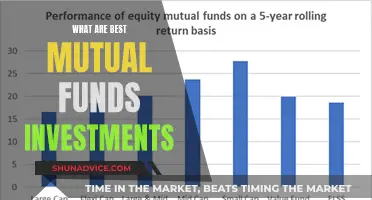
Mutual funds are a great way to invest your money in the Philippines. They are a type of investment vehicle that pools money from multiple investors and allocates it to various investment options like stocks, bonds, and money market instruments. The fund is managed by experts who decide which investment options to seize, making it a good option for those who don't have the time or expertise to manage their own investments. Mutual funds are also beginner-friendly, with a low capital requirement, making it possible to invest with as little as ₱1,000. They are highly liquid, regulated, and provide instant diversification, reducing the potential impact of any single investment's performance. They are also a great equalizer, as the rate of return is proportionate to the amount invested, giving everyone an equal opportunity to grow their wealth.
| Characteristics | Values |
|---|---|
| Capital requirement | Low; between ₱1,000 and ₱5,000 |
| Management | Professional; full-time fund managers |
| Returns | Potentially higher |
| Liquidity | High |
| Regulation | Highly regulated by the Securities and Exchange Commission (SEC) |
| Investment exposure | Global |
| Taxation | Tax-exempt |
| Investor suitability | Suitable for beginners |
| Risk | Reduced |
What You'll Learn

Low capital requirement
Mutual funds in the Philippines are an attractive investment option due to their low capital requirement, which makes them accessible to a wide range of individuals. Most mutual funds require a minimum initial investment of only ₱1,000, with additional investments as low as ₱500. This is in stark contrast to direct investments such as purchasing stocks or treasury bills, which often necessitate substantial capital.
The low capital requirement of mutual funds allows individuals like Maria, a young professional with limited funds, to enter the world of investments and begin growing their wealth. With mutual funds, you don't need to be a millionaire to start investing and can participate in the earnings potential of some of the biggest brands in the Philippines and beyond.
Additionally, mutual funds are highly liquid, allowing investors to buy or sell shares at any time and providing easy access to their money. They are also well-regulated by the Securities and Exchange Commission (SEC), ensuring the safety and security of investors' funds.
Retirement Fund Investment: Choosing the Right Path
You may want to see also

Instant diversification
Mutual funds help mitigate risk by investing in a wide range of securities, reducing the potential impact of any single investment's performance. By law, mutual funds are required to diversify their investments across different areas of the market, providing investors with instant exposure to a variety of asset classes, such as stocks, bonds, and money market instruments. This diversification helps protect investors from the volatility of individual securities and industries.
For example, consider Ana, an investor in a multi-asset mutual fund. By investing in this fund, Ana gains exposure to a diversified portfolio of various asset classes. This diversification shields her from the volatility of individual securities and industries, as the mutual fund spreads its investments across different areas of the market.
Mutual funds are ideal for those who want to minimise risk while investing. They are perfect for those who don't have the time or expertise to manage their investment portfolio actively. By investing in mutual funds, you can benefit from instant diversification, which can help protect your investments and maximise your earnings potential.
KiwiSaver Investment Funds: Where Does Your Money Go?
You may want to see also

Liquidity
Mutual funds in the Philippines typically create new shares to be sold to new investors, ensuring a continuous supply. Additionally, investors can easily sell their mutual fund shares back to the fund, receiving the redemption proceeds within a short timeframe. This liquidity makes it easier for investors to access their money when needed.
For example, let's consider an investor named Miguel, who needs quick access to his money. He invests in a mutual fund and decides to redeem his shares. Within a few banking days, Miguel receives the redemption proceeds, allowing him to convert his investment into cash without significant delays.
The high liquidity of mutual funds in the Philippines provides investors with the advantage of quick access to their funds, making it a convenient and flexible investment option.
Semi-Short-Term House Fund: Where to Invest?
You may want to see also

Safety and security
Safety is a crucial consideration when investing in mutual funds. The good news is that mutual funds in the Philippines are highly regulated by the Securities and Exchange Commission (SEC) under the Investment Company Act and its implementing rules. These regulations prohibit mutual funds from investing in certain risky products and engaging in questionable transactions. Mutual funds are also required to submit regular reports to the SEC and their shareholders, ensuring transparency and accountability.
Furthermore, mutual funds hold all their assets with highly reputable commercial banks for safekeeping, providing an additional layer of security for investors' funds. In the Philippines, investors in mutual funds have the right to vote during shareholders' meetings and are allowed to know where the funds are invested. This transparency and investor participation foster trust and confidence in mutual funds as a safe investment option.
Mutual funds are ideal for those who want to grow their money over time while prioritising safety and security. They can be used as a savings medium for retirement, education funding, or building a long-term cash fund for future financial goals. While typically considered a retail financial product, mutual funds are also excellent for augmenting yields from organisational funds and enhancing their diversification. Mutual funds have been a popular choice for pension and trust programs, employee benefit funding, and institutional asset-liability matching.
When investing in mutual funds, it's important to remember that there is always some level of risk involved, and the potential for losses exists. However, the regulated nature of mutual funds in the Philippines provides investors with a level of protection and peace of mind.
Betterment Investment Funds: Where is Your Money Located?
You may want to see also

Tax-exempt status
Mutual funds in the Philippines have been excluded from the definition of gross income since 1 January 1998. This means that gains realised by investors upon redemption of their mutual fund shares are not subject to personal income tax. This tax-free status makes mutual funds a more profitable and attractive investment option for individuals seeking to optimise their returns.
However, it is important to note that mutual funds are still subject to certain taxes and regulations. For example, capital gains on mutual funds are subject to a 15% tax on net capital gains. Additionally, mutual funds are required to submit regular reports to the Securities and Exchange Commission (SEC) and their shareholders, ensuring transparency and accountability.
The tax-exempt status of mutual funds in the Philippines provides investors with an opportunity to grow their wealth while minimising their tax liability. This benefit, combined with the other advantages of mutual funds such as professional management, low capital requirements, and diversification, makes mutual funds a popular investment choice for Filipinos.
Taxes on Mutual Funds in Other Countries
While the focus is on the Philippines, it is worth noting that the tax treatment of mutual funds can vary by country. For example, in some countries, mutual funds invested in government or municipal bonds are often referred to as tax-exempt funds because the interest generated by these bonds is not subject to income tax. However, it is important to understand the specific tax implications of mutual funds in your country, as there may be other taxes or regulations that apply.
Seeking Professional Advice
While the tax-exempt status of mutual funds in the Philippines can be advantageous, it is always prudent to seek the help of a reputable financial advisor before making any investment decisions. A financial advisor can provide personalised guidance, taking into account your financial goals, risk tolerance, and investment horizon, to ensure that your investment strategy aligns with your specific circumstances and objectives.
Safe Mutual Fund Investments: Picking the Right Option
You may want to see also
Frequently asked questions
A mutual fund is an investment vehicle where money from multiple investors is pooled and invested in stocks, bonds, and other securities. It is managed by a professional fund manager and offers individuals a way to diversify their investments and access a wider range of assets.
Mutual funds offer several benefits, including professional management, low capital requirements, instant diversification, liquidity, safety, and the potential for higher returns. They are also convenient, provide exposure to global markets, and have tax advantages in the Philippines.
When choosing a mutual fund, consider your financial goals, risk tolerance, investment horizon, and the types of assets the fund invests in. Evaluate the fund's performance, fees, and the competence of the fund manager.
In the Philippines, mutual funds can be categorized into four basic types: stock/equity funds, balanced funds, bond funds, and money market funds. Each type caters to different investment styles, risk appetites, and financial goals.
You can invest in mutual funds directly through the mutual fund company or indirectly through fund supermarkets or investment platforms. The process typically involves selecting a fund, opening an account, submitting the required documents, and funding your investment.







